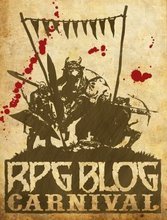I know I’ve said it a couple of times already, but thanks to everyone who’s commented on this thread. I hope you’ve had as much fun exploring this topic as I have.
Today is reader’s choice day. I’ve put together a small list of recommendations from readers for games they thought should’ve been included but weren’t. So without further ado…
Siskoid suggested:
- Arcanum: Set in the ancient world before Atlantis disappeared beneath the waves, Arcanum is the precuror to Talislanta. In contrast to D&D’s high fantasy, Arcanum featured civilizations based on real-world cultures.
- Bullwinkle and Rocky Role-Playing Party Game: You remember Rocky and Bullwinkle, right? Now you too can play one of the characters from the TV show or even (depending on the version of the rules you use) an brand-new one in the world of Frostbite Falls.
- Critter Commandos: Kinda like Toon for miniatures, from what I can tell. [Correct me if I’m wrong, Siskoid. This is a new one for me.] You play a character like those in Saturday morning cartoons.
- Dream Park: Based on the novel by Larry Niven and Steven Barnes, in Dream Park you play a player playing an RPG PC. Yup, your character’s character is a PC in “subgame”, which can be from any RPG genre. I know this sounds kinda silly (not to mention recursive), but I’ve found the game to be a lot of fun. I particularly like the fact that you can use the same character in different genres.
- StuporPowers!: Tired of those boring, old, everyday powers like x-ray vision, telepathy, and super-strength? A parody of superhero games, StuporPowers allows you to play a character with more … ahem … “unique” powers. What kind of powers? Oh, powers such as “price check anything”, “dust bunny army”, and “b.o. force field”. My favorite is “mail yourself anywhere”.
Luis suggested:
- Justifiers: A science-fiction game, you play a human-animal combination “critter” who’s job it to act as part of the strong-arm force for the corporation who made you. Your goal: buy your freedom. But to do that you’re going to need to survive.
Rebecca suggested:
- Feng Shui: The Hong Kong cinema of rpgs, Feng Shui focuses on all the things you expect from Hong Kong cinema: martial arts, magic, guns, high-technology, and … oh yeah, martial arts.
Both Siskoid and Rebecca recommended:
- Teenagers from Outer Space: A very rules-light system based on the more humorous anime such as Ranma 1/2 and Dragonball. The game setting is just want the name says — aliens from space become fascinated by Earth’s “teen culture” and decide to bring their children here. In this game you play either a normal human or an alien teen-ager trying to fit into Earth culture.
Finally, some further recommendations from me:
- Rêve: the Dream Ouroboros: Since Rifts really wasn’t that less-known, this is my replacement suggestion for “R”. Based on the French game Rêve de Dragon, the game is set in a fantasy world dreamed into reality by dragons.
- S.L.U.G: Simple, Laid-Back Universal Game: Even if you never play this game, read the rules to your group sometime during a break in your game session. Seriously. In fact, you can read them right now. Go ahead. I’ll wait. SLUG is a free rules system you can get on-line through the link above. The creators claim you can get the entire set of rules on one side of a sheet of paper, but I’ve never gotten it below two sheets and still had the type large enough to read.






